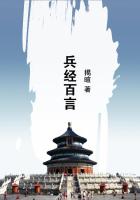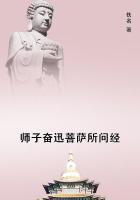That was their misfortune. As Emile ***uet has very wittily put it, "Monsieur Dudevant, about whom she complained so much, seems to have had no other fault than that of being merely an ordinary man, which, of course, is unendurable to a superior woman.
The situation was perhaps equally unendurable for the man." This is quite right, for Casimir was very soon considerably disconcerted.
He was incapable of understanding her psychology, and, as it seemed impossible to him that a woman was not his inferior, he came to the logical conclusion that his wife was "idiotic."This was precisely his expression, and at every opportunity he endeavoured to crush her by his own superiority. All this seems to throw some light on his character and also on the situation.
Here was a man who had married the future George Sand, and he complained, in all good faith, that his wife was "idiotic"!
Certainly, on comparing the _Correspondance_ with the _Histoire de ma vie_, the difference of tone is most striking. The letters in which Baronne Dudevant tells, day by day, of her home life are too enthusiastic for the letters of an unhappy wife.
There are receptions at Nohant, lively dinners, singing and dancing.
All this is, at any rate, the surface, but gradually the misunderstandings are more pronounced, and the gulf widens.
There may have been a misunderstanding at the very beginning of their married life, and Aurore may have had a surprise of the nature of the one to which Jane de Simerose confesses in _L'Ami des femmes_.
In an unpublished letter written much later on, in the year 1843, from George Sand to her half-brother Hippolyte Chatiron on the occasion of his daughter's engagement, the following lines occur:
"See that your son-in-law is not brutal to your daughter the first night of their marriage. . . . Men have no idea that this amusement of theirs is a martyrdom for us. Tell him to sacrifice his own pleasure a little, and to wait until he has taught his wife gradually to understand things and to be willing. There is nothing so frightful as the horror, the suffering and the disgust of a poor girl who knows nothing and who is suddenly violated by a brute.
We bring girls up as much as possible like saints, and then we hand them over like fillies. If your son-in-law is an intelligent man and if he really loves your daughter, he will understand his _role_, and will not take it amiss that you should speak to him beforehand."[2]
[2] Communicated by M. S. Rocheblave.
Is George Sand recalling here any hidden and painful memories?
Casimir had, at bottom, a certain brutality, which, later on, was very evident. The question is whether he had shown proofs of it at a time when it would have been wiser to have refrained.
However that may be, the fundamental disagreement of their natures was not long in ****** itself felt between the husband and wife.
He was matter-of-fact, and she was romantic; he only believed in facts, and she in ideas; he was of the earth, earthy, whilst she aspired to the impossible. They had nothing to say to each other, and when two people have nothing to say, and love does not fill up the silences, what torture the daily _tete-a-tete_ must be.
Before they had been married two years, they were bored to death.
They blamed Nohant, but the fault was in themselves. Nohant seemed unbearable to them, simply because they were there alone with each other.
They went to Plessis, perhaps in the hope that the remembrance of the days of their engagement might have some effect on them.
It was there, in 1824, that the famous scene of the blow took place.
They were playing at a regular children's game in the park, and throwing sand at each other. Casimir lost his patience and struck his wife. It was certainly impolite, but Aurore did not appear to have been very indignant with her husband at the time.
Her grievances were quite of another kind, less tangible and much more deeply felt.
From Plessis they went to Ormesson. We do not know what took place there, but evidently something which made a deep impression morally, something very serious. A few years later, referring to this stay at Ormesson, George Sand wrote to one of her friends:
"You pass by a wall and come to a house. . . . If you are allowed to enter you will find a delightful English garden, at the bottom of which is a spring of water hidden under a kind of grotto.
It is all very stiff and uninteresting, but it is very lonely.
I spent several months there, and it was there that I lost my health, my confidence in the future, my gaiety and my happiness.
It was there that I felt, and very deeply too, my first approach of trouble. . . ."[3]
[3] Extract from the unpublished letters of George Sand to Dr. Emile Regnault.
They left Ormesson for Paris, and Paris for Nohant, and after that, by way of trying to shake off the dulness that was oppressing them, they had recourse to the classical mode of diversion--a voyage.
They set off on the 5th of July, 1825, for that famous expedition to the Pyrenees, which was to be so important a landmark in Aurore Dudevant's history. On crossing the Pyrenees, the scenery, so new to her--or rather the memory of which had been lying dormant in her mind since her childhood--filled her with wild enthusiasm.
This intense emotion contributed to develop within her that sense of the picturesque which, later on, was to add so considerably to her talent as a writer. She had hitherto been living in the country of plains, the Ile-de-France and Berry. The contrast made her realize all the beauties of nature, and, on her return, she probably understood her own familiar scenery, and enjoyed it all the more.
She had hitherto appreciated it vaguely. Lamartine learnt to love the severe scenery of Milly better on returning to it after the softness of Italy.
The Pyrenees served, too, for Baronne Dudevant as the setting for an episode which was unique in her sentimental life.
In the _Histoire de ma vie_ there is an enigmatical page in which George Sand has intentionally measured and velled every expression.















